 Besides those out working in the industry we also heard from some university students today at the Transition To A Bio Economy conference. Lance Andrew Stewart is a grad student at the University of Tennessee. He did a very technical presentation on locating ethanol plants.
Besides those out working in the industry we also heard from some university students today at the Transition To A Bio Economy conference. Lance Andrew Stewart is a grad student at the University of Tennessee. He did a very technical presentation on locating ethanol plants.
His work focused on the location determinants that attract potential plants in certain areas. He says that factors include, access to feedstocks like corn and locating away from an existing plant. He also made a point of saying that although plants can be very helpful to a rural community they must have enough infrastructure to support one.
You can listen to my interview with Lance here: [audio:http://www.zimmcomm.biz/farm-foundation/ff-bio-08-stewart.mp3]
You can also download the interview using this link (mp3).


 We had USDA Rural Development represented here at the Transition To A Bio Economy conference by Tony Crooks. He works with their rural business cooperatives program and has done a lot of work with communities in the area of ethanol and biodiesel.
We had USDA Rural Development represented here at the Transition To A Bio Economy conference by Tony Crooks. He works with their rural business cooperatives program and has done a lot of work with communities in the area of ethanol and biodiesel.
 The luncheon speaker at the Transition To A Bio Economy conference focused on managing risk. Paul Willems works for
The luncheon speaker at the Transition To A Bio Economy conference focused on managing risk. Paul Willems works for 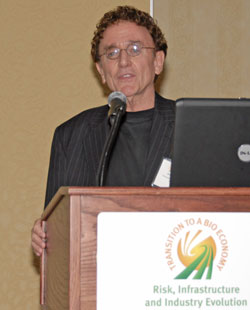 Two key words in a presentation at the Transition To A Bio Economy Conference were flexibility and diversification. These are important to managing risk, especially in R&D for renewable fuels.
Two key words in a presentation at the Transition To A Bio Economy Conference were flexibility and diversification. These are important to managing risk, especially in R&D for renewable fuels. The second session here at the Transition To A Bio Economy conference was on risk and uncertainty.
The second session here at the Transition To A Bio Economy conference was on risk and uncertainty.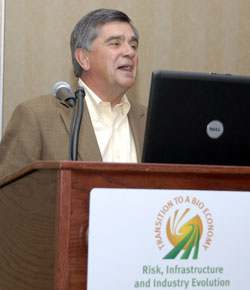 One of our speakers here at the Transition To A Bio Economy conference brought the discussion down to the farm level. John Miranowski, Iowa State University, spoke about the impact of biofuels on the rural economy and the farm structure.
One of our speakers here at the Transition To A Bio Economy conference brought the discussion down to the farm level. John Miranowski, Iowa State University, spoke about the impact of biofuels on the rural economy and the farm structure.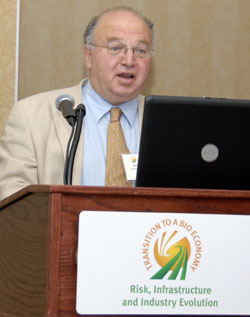 Like the first speaker on our program today here at the Transition To A Bio Economy conference, our second speaker, David Zilberman, University of California, Berkeley, says we need to increase agricultural productivity.
Like the first speaker on our program today here at the Transition To A Bio Economy conference, our second speaker, David Zilberman, University of California, Berkeley, says we need to increase agricultural productivity.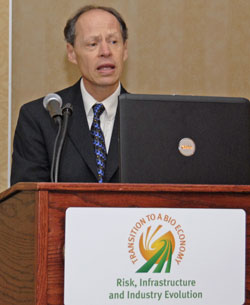 The first speaker here at the Transition To A Bio Economy conference is Michael Wetzstein, University of Georgia. His talk deals with two issues. One is on price volatility and the other is on food and fuel.
The first speaker here at the Transition To A Bio Economy conference is Michael Wetzstein, University of Georgia. His talk deals with two issues. One is on price volatility and the other is on food and fuel.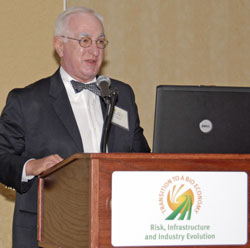 The Farm Foundation conference, “Transition To A Bio Economy, Risk, Infrastructure and Industry Evolution” is underway here in Berkeley, CA. Getting us started was Farm Foundation Vice President, Steve Halbrook.
The Farm Foundation conference, “Transition To A Bio Economy, Risk, Infrastructure and Industry Evolution” is underway here in Berkeley, CA. Getting us started was Farm Foundation Vice President, Steve Halbrook.